#muslim population growth
Explore tagged Tumblr posts
Text
Indian Prime Minister Narendra Modi is, by some measures, the most popular leader in the world. Prior to the 2024 election, his Bharatiya Janata Party (BJP) held an outright majority in the Lok Sabha (India’s Parliament) — one that was widely projected to grow after the vote count. The party regularly boasted that it would win 400 Lok Sabha seats, easily enough to amend India’s constitution along the party's preferred Hindu nationalist lines.
But when the results were announced on Tuesday, the BJP held just 240 seats. They not only underperformed expectations, they actually lost their parliamentary majority. While Modi will remain prime minister, he will do so at the helm of a coalition government — meaning that he will depend on other parties to stay in office, making it harder to continue his ongoing assault on Indian democracy.
So what happened? Why did Indian voters deal a devastating blow to a prime minister who, by all measures, they mostly seem to like?
India is a massive country — the most populous in the world — and one of the most diverse, making its internal politics exceedingly complicated. A definitive assessment of the election would require granular data on voter breakdown across caste, class, linguistic, religious, age, and gender divides. At present, those numbers don’t exist in sufficient detail.
But after looking at the information that is available and speaking with several leading experts on Indian politics, there are at least three conclusions that I’m comfortable drawing.
First, voters punished Modi for putting his Hindu nationalist agenda ahead of fixing India’s unequal economy. Second, Indian voters had some real concerns about the decline of liberal democracy under BJP rule. Third, the opposition parties waged a smart campaign that took advantage of Modi’s vulnerabilities on the economy and democracy.
Understanding these factors isn’t just important for Indians. The country’s election has some universal lessons for how to beat a would-be authoritarian — ones that Americans especially might want to heed heading into its election in November.
-via Vox, June 7, 2024. Article continues below.
A new (and unequal) economy
Modi’s biggest and most surprising losses came in India’s two most populous states: Uttar Pradesh in the north and Maharashtra in the west. Both states had previously been BJP strongholds — places where the party’s core tactic of pitting the Hindu majority against the Muslim minority had seemingly cemented Hindu support for Modi and his allies.
One prominent Indian analyst, Yogendra Yadav, saw the cracks in advance. Swimming against the tide of Indian media, he correctly predicted that the BJP would fall short of a governing majority.
Traveling through the country, but especially rural Uttar Pradesh, he prophesied “the return of normal politics”: that Indian voters were no longer held spellbound by Modi’s charismatic nationalist appeals and were instead starting to worry about the way politics was affecting their lives.
Yadav’s conclusions derived in no small part from hearing voters’ concerns about the economy. The issue wasn’t GDP growth — India’s is the fastest-growing economy in the world — but rather the distribution of growth’s fruits. While some of Modi’s top allies struck it rich, many ordinary Indians suffered. Nearly half of all Indians between 20 and 24 are unemployed; Indian farmers have repeatedly protested Modi policies that they felt hurt their livelihoods.
“Everyone was talking about price rise, unemployment, the state of public services, the plight of farmers, [and] the struggles of labor,” Yadav wrote...
“We know for sure that Modi’s strongman image and brassy self-confidence were not as popular with voters as the BJP assumed,” says Sadanand Dhume, a senior fellow at the American Enterprise Institute who studies India.
The lesson here isn’t that the pocketbook concerns trump identity-based appeals everywhere; recent evidence in wealthier democracies suggests the opposite is true. Rather, it’s that even entrenched reputations of populist leaders are not unshakeable. When they make errors, even some time ago, it’s possible to get voters to remember these mistakes and prioritize them over whatever culture war the populist is peddling at the moment.
Liberalism strikes back
The Indian constitution is a liberal document: It guarantees equality of all citizens and enshrines measures designed to enshrine said equality into law. The signature goal of Modi’s time in power has been to rip this liberal edifice down and replace it with a Hindu nationalist model that pushes non-Hindus to the social margins. In pursuit of this agenda, the BJP has concentrated power in Modi’s hands and undermined key pillars of Indian democracy (like a free press and independent judiciary).
Prior to the election, there was a sense that Indian voters either didn’t much care about the assault on liberal democracy or mostly agreed with it. But the BJP’s surprising underperformance suggests otherwise.
The Hindu, a leading Indian newspaper, published an essential post-election data analysis breaking down what we know about the results. One of the more striking findings is that the opposition parties surged in parliamentary seats reserved for members of “scheduled castes” — the legal term for Dalits, the lowest caste grouping in the Hindu hierarchy.
Caste has long been an essential cleavage in Indian politics, with Dalits typically favoring the left-wing Congress party over the BJP (long seen as an upper-caste party). Under Modi, the BJP had seemingly tamped down on the salience of class by elevating all Hindus — including Dalits — over Muslims. Yet now it’s looking like Dalits were flocking back to Congress and its allies. Why?
According to experts, Dalit voters feared the consequences of a BJP landslide. If Modi’s party achieved its 400-seat target, they’d have more than enough votes to amend India’s constitution. Since the constitution contains several protections designed to promote Dalit equality — including a first-in-the-world affirmative action system — that seemed like a serious threat to the community. It seems, at least based on preliminary data, that they voted accordingly.
The Dalit vote is but one example of the ways in which Modi’s brazen willingness to assail Indian institutions likely alienated voters.
Uttar Pradesh (UP), India’s largest and most electorally important state, was the site of a major BJP anti-Muslim campaign. It unofficially kicked off its campaign in the UP city of Ayodhya earlier this year, during a ceremony celebrating one of Modi’s crowning achievements: the construction of a Hindu temple on the site of a former mosque that had been torn down by Hindu nationalists in 1992.
Yet not only did the BJP lose UP, it specifically lost the constituency — the city of Faizabad — in which the Ayodhya temple is located. It’s as direct an electoral rebuke to BJP ideology as one can imagine.
In Maharashtra, the second largest state, the BJP made a tactical alliance with a local politician, Ajit Pawar, facing serious corruption charges. Voters seemingly punished Modi’s party for turning a blind eye to Pawar’s offenses against the public trust. Across the country, Muslim voters turned out for the opposition to defend their rights against Modi’s attacks.
The global lesson here is clear: Even popular authoritarians can overreach.
By turning “400 seats” into a campaign slogan, an all-but-open signal that he intended to remake the Indian state in his illiberal image, Modi practically rang an alarm bell for constituencies worried about the consequences. So they turned out to stop him en masse.
The BJP’s electoral underperformance is, in no small part, the direct result of their leader’s zealotry going too far.
Return of the Gandhis?
Of course, Modi’s mistakes might not have mattered had his rivals failed to capitalize. The Indian opposition, however, was far more effective than most observers anticipated.
Perhaps most importantly, the many opposition parties coordinated with each other. Forming a united bloc called INDIA (Indian National Developmental Inclusive Alliance), they worked to make sure they weren’t stealing votes from each other in critical constituencies, positioning INDIA coalition candidates to win straight fights against BJP rivals.
The leading party in the opposition bloc — Congress — was also more put together than people thought. Its most prominent leader, Rahul Gandhi, was widely dismissed as a dilettante nepo baby: a pale imitation of his father Rajiv and grandmother Indira, both former Congress prime ministers. Now his critics are rethinking things.
“I owe Rahul Gandhi an apology because I seriously underestimated him,” says Manjari Miller, a senior fellow at the Council on Foreign Relations.
Miller singled out Gandhi’s yatras (marches) across India as a particularly canny tactic. These physically grueling voyages across the length and breadth of India showed that he wasn’t just a privileged son of Indian political royalty, but a politician willing to take risks and meet ordinary Indians where they were. During the yatras, he would meet directly with voters from marginalized groups and rail against Modi’s politics of hate.
“The persona he’s developed — as somebody kind, caring, inclusive, [and] resolute in the face of bullying — has really worked and captured the imagination of younger India,” says Suryanarayan. “If you’ve spent any time on Instagram Reels, [you’ll see] an entire generation now waking up to Rahul Gandhi’s very appealing videos.”
This, too, has a lesson for the rest of the world: Tactical innovation from the opposition matters even in an unfair electoral context.
There is no doubt that, in the past 10 years, the BJP stacked the political deck against its opponents. They consolidated control over large chunks of the national media, changed campaign finance law to favor themselves, suborned the famously independent Indian Electoral Commission, and even intimidated the Supreme Court into letting them get away with it.
The opposition, though, managed to find ways to compete even under unfair circumstances. Strategic coordination between them helped consolidate resources and ameliorate the BJP cash advantage. Direct voter outreach like the yatra helped circumvent BJP dominance in the national media.
To be clear, the opposition still did not win a majority. Modi will have a third term in office, likely thanks in large part to the ways he rigged the system in his favor.
Yet there is no doubt that the opposition deserves to celebrate. Modi’s power has been constrained and the myth of his invincibility wounded, perhaps mortally. Indian voters, like those in Brazil and Poland before them, have dealt a major blow to their homegrown authoritarian faction.
And that is something worth celebrating.
-via Vox, June 7, 2024.
#india#narendra modi#pm modi#modi#bjp#lok sabha elections#rahul gandhi#democracy#2024 elections#authoritarianism#anti authoritarian#good news#hope
746 notes
·
View notes
Text
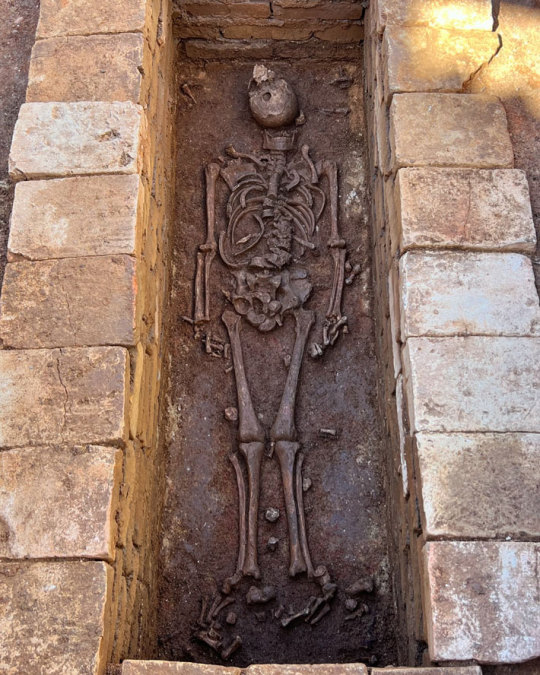
Three Roman Graves Uncovered in Portugal
Three burials dating to the 5th or 6th century AD have been unearthed in the ancient Roman city of Ossónoba in Faro, southern Portugal.
The Ossónoba’s first archaeological evidence dates back to the 4th century B.C., when the Phoenicians settled in the Western Mediterranean. The city was then called Ossónoba From the 2nd century B.C. until the 8th A.D. the city was under Roman and Visigoth dominance being afterwards conquered by the Muslims in 713.
A team of archaeologists from ERA Arqueologia discovered ancient Roman structures and the remains of a man, woman, and child while conducting excavations over a 5,000 square meter area that will eventually house a real estate development.
The excavations, which took place before a construction project, revealed the grave of a man whose skeleton was complete and who would have been between 39 and 45 years old, as well as a young woman under the age of 25, and a baby who would have been no more than six months old, according to archaeologist Francisco Correa.
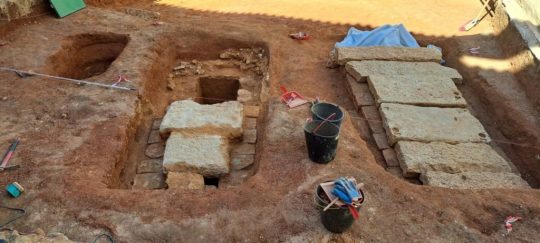
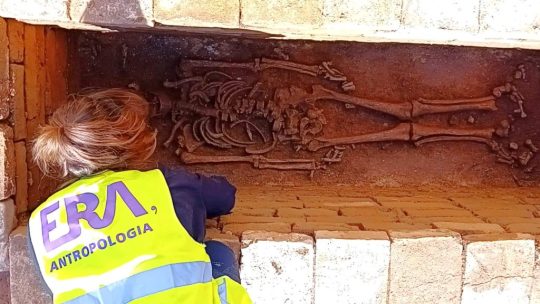
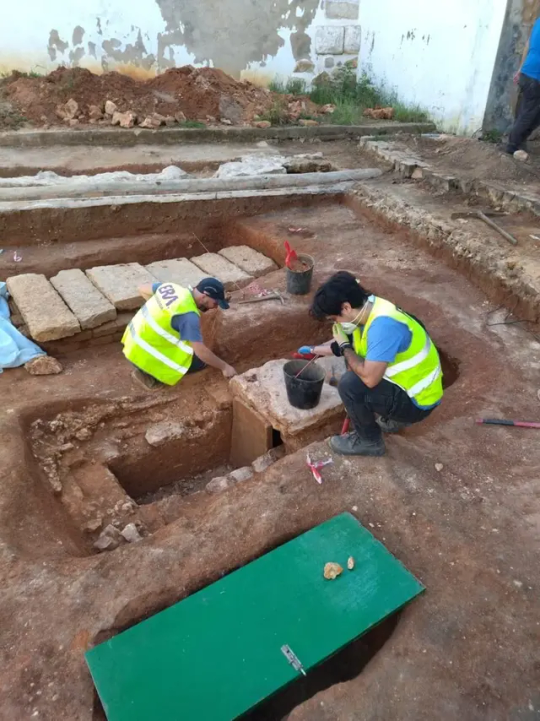
Francisco Correia, the project’s head archaeologist, said in a statement that the discoveries were made in an old truck repair workshop and are believed to date from the 5th or 6th century.
The tombs appear to have been looted in the past to steal “small bracelets, necklaces, and rings,” according to anthropologist Cláudia Maio. The tombs indicate that the people may have had “some economic status” as they were not simply placed in open graves but instead buried in carefully built graves.
The proximity of the three people’s graves seems to indicate that they were family members, though the team cannot be certain of that. “But we cannot say anything for sure,” the anthropologist said.
To learn more, the researchers hope to be able to provide more precise answers through DNA tests and isotopic analysis techniques used to determine population movements and dietary habits from chemical traces in ancient human remains.
This latest archaeological discovery did not come as a surprise to archaeologists, who had already led similar works which resulted in the discovery of a Roman game artifact believed to date back to the first century AD in 2020.


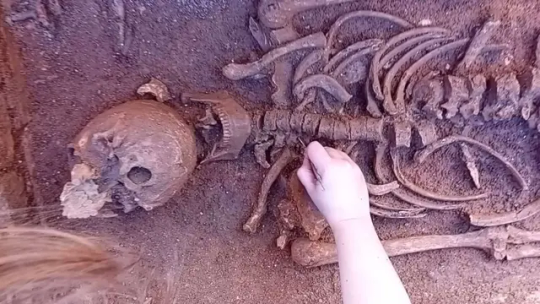
“We know that we are in an area with archaeological potential where there is a 17th-century convent (of Santo António dos Capuchos) to the west, and to the east lies the area where the mosaic of the Ocean God (Deus Oceano), now a national treasure, was found,” he said.
What did come as a surprise to archaeologists was the location of the tombs.
“Based on previous studies, this would have been an area that was possibly residential or more linked to industrial activities. There are many traces of salterns. Largo da Madalena would have been the entrance to the urban area of the city of Ossónoba. The identified graves are in the Figuras area, near Teatro Lethes, close to the Ermida de São Sebastião and the Pavilion of Escola D. Afonso III. This area is almost within the urban fabric,” the archaeologist explained, adding that this illustrates both the “growth and decline of Ossónoba.”
The graves of the man and the woman “were sealed with limestone slabs,” believed to be reused parts from “some of the most emblematic buildings that would have been here in the area,” he believes.
According to the project manager of ERA Arqueologia, who was co-responsible for the work, in addition to the graves, hundreds of small pieces were also discovered which suggest that there may also have been a mosaic there.
The researchers also recovered Roman artifacts in the area, including ceramics, bone dice, nails, pins, a spoon, possible evidence of a dye factory, and coins minted during the reign of Constantine the Great, between A.D. 306 and 337.
Cover Photo: Roman mosaic of the god Oceanus, part of the ancient city of Ossónoba, the modern town of Faro, in Portugal.
By Leman Altuntaş.
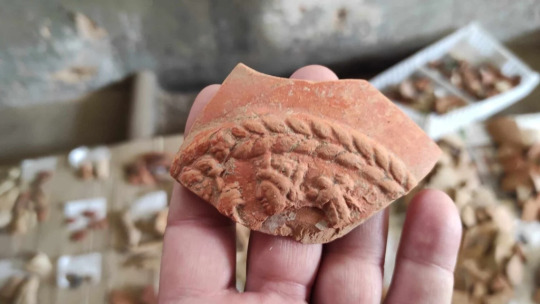

#Three Roman Graves Uncovered in Portugal#Roman city of Ossónoba in Faro#ancient grave#ancient tomb#ancient artifacts#archeology#archeolgst#history#history news#ancient history#ancient culture#ancient civilizations#roman history#roman empire#roman art
256 notes
·
View notes
Text
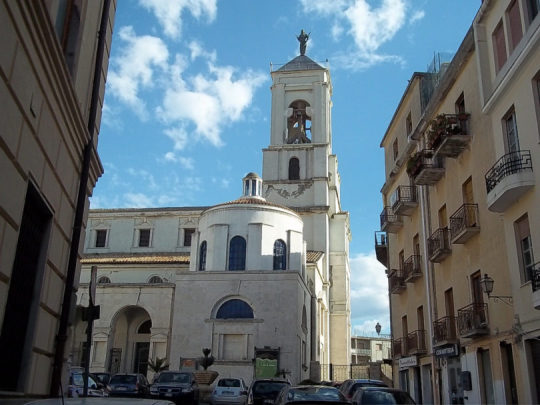


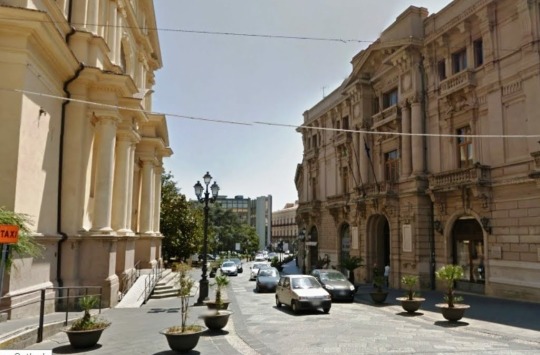
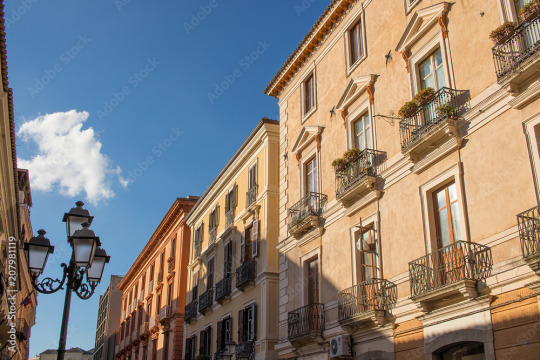


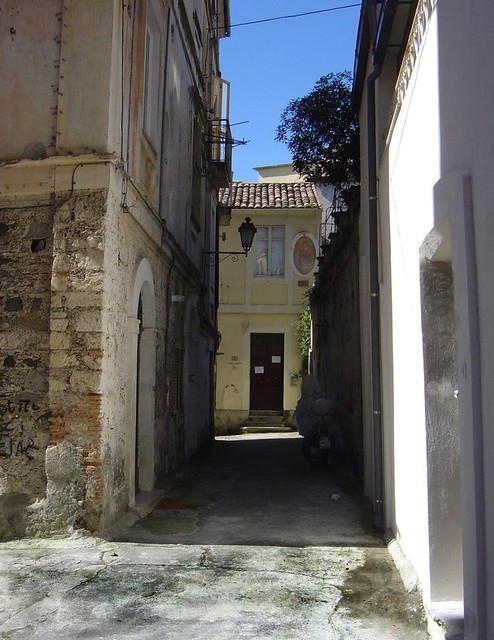

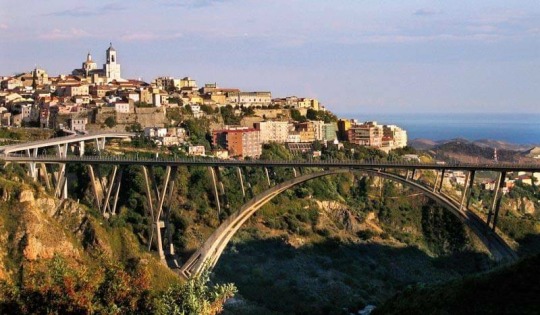
Catanzaro, Calabria, Italy
This ancient town which rises on a rock is the capital of the Calabria region. It was founded in 9th century by the Byzantines and was built over three hills in order to protect the town from the Saracen attacks arriving from the lonian sea.
At the beginning of the tenth century (c. 903), the city of Catanzaro was occupied by the Muslim Saracens, who founded an emirate and took the Arab name of قطنصار - Qatanşār.
An Arab presence is evidenced by findings at an eighth-century necropolis which had items with Arabic inscriptions. Around the year 1050, Catanzaro rebelled against Saracen dominance and returned to a brief period of Byzantine control.
Under the Byzantine dominion, between the end of the 9th and the beginning of the 10th century, Calabria was one was one the first places in Italy to introduce the breeding of the silkworm in the 11th century.
According to French historian André Guillou, mulberry trees for the production of raw silk were introduced to Calabria by the Byzantines at the end of the 9th century. Mulberry leaves are the only leaves that silkworms eat.
Around 1050, the theme of Calabria had cultivated 24,000, mulberry trees for their foliage, with growth still ongoing.
The peasants of the countryside around the city produced the raw silk, which was then woven in the silk workshops of Catanzaro. A large part of the population was involved in this business, and the silk of Catanzaro supplied almost all of Europe.
The silk was sold in a large market fair in the port of Reggio Calabria, to Spanish, Venetians, Genovese and Dutch merchants.
Today, three young friends have come together to bring local traditions back to the fore. In 2014 they decided to build their future in San Floro, a tiny village of 600 inhabitants near the city of Catanzaro and restore the traditional mulberry tree planting and cultivation needed for the rearing of silkworms. Historically, San Floro was famous for a very significant production of raw silk in the 17th century, though this heritage had been completely lost in modern times.
The only surviving elements of this rich legacy were the 3,000 abandoned mulberry trees and the memory of the elderly villagers. Miriam and her friends brought back the production of silk, rewinding the threads of history and travelling across the world to exchange best practices with silk institutes in Thailand, India, Switzerland, and France.
As part of its development, they trained people interested in their new, sustainable production model and also brought thousands of tourists from all over the world to visit their farm (Nido di Seta) to experience how silk is produced first-hand.
Catanzaro is a windy city due to its altitude and position between two seas. In fact, there is only 30 km separating the Ionian Sea from the Tyrrhenian Sea and Catanzaro is wide open to the constant strong breezes from the Ionian Sea and the Sila mountains.
Follow us on Instagram, @calabria_mediterranea
#catanzaro#calabria#italy#italia#south italy#southern italy#italian#mediterranean#silk#the silkworm#silk road#europe#architecture#textile#loom#mulberry tree#history#muslim#saracens#italian landscape#landscape#mediterranean sea#arab#byzantine#byzantine empire#weaving#nido di seta
23 notes
·
View notes
Text
India is in the middle of a 44-day exercise to elect its next government, with Prime Minister Narendra Modi tipped to return his Bharatiya Janata Party to power for a third consecutive term. Modi, who aims to win nearly three-quarters of the country’s 543 parliamentary seats, has surprised many observers by using dehumanizing anti-Muslim language on the campaign trail—rhetoric that is more direct than that of his past speeches.
So far, the BJP campaign has focused on creating an irrational fear among India’s Hindu majority that if Modi doesn’t return as prime minister, a share of their private wealth and affirmative action job quotas will be given to Indian Muslims. Modi and his party have doubled down on this narrative at a moment when reports suggest that their quest for a supermajority is unlikely to succeed. The brazen continuation of such anti-Muslim rhetoric differentiates this campaign from the two others that have put Modi in the prime minister’s office.
Hate speech is a criminal offense in India, and it is specifically barred during an election campaign. However, Modi chose the three leaders of India’s Election Commission, the agency charged with conducting free and fair polls, and it has ignored his flagrant violations of the election code. As a result, as the campaign continues through the end of May, so too will Modi’s anti-Muslim tirades. India is expected to announce its election results on June 4.
If the BJP wins and Modi is once again crowned prime minister, his Islamophobic rhetoric will not simply disappear. Many political leaders campaign in poetry and govern in prose, but hateful rhetoric has real-life consequences. Modi’s campaign speeches have put a target on Indian Muslims’ backs, redirecting the anger of poor and marginalized Hindu communities away from crony capitalists and the privileged upper castes. It underscores an attempt to make members of the Muslim minority second-class citizens in a de facto Hindu Rashtra, or state.
These social schisms need only a small spark to burst into communal violence, which would damage India’s global status and growth. Furthermore, Modi’s campaign rhetoric is matched by the BJP’s choice to not put up candidates in Muslim-majority Kashmir, reducing its stake in ensuring robust democracy in a region that New Delhi has ruled directly since 2019. His language will also have a direct bearing on India’s fraught ties with its neighbor Pakistan. Finally, the state-backed ill treatment will likely not be limited to Indian Muslims—meaning that other religious minorities, such as Christians and Sikhs, will also be affected.
Around 200 million Muslims live in India—the second-largest Muslim population in the world, after that of Indonesia. Few mainstream Indian political leaders have plummeted to such depths in castigating these citizens. Modi’s campaign rhetoric makes clear that if he is elected to a third consecutive term, the nation’s Muslims will stand politically disempowered, economically marginalized, and deprived of their constitutional rights.
Modi’s political rise came in the wake of significant violence against Muslims in Gujarat in 2002, when he was the state’s chief minister. Due to his role in the violence, the European Union, the United Kingdom, and the United States all temporarily barred his entry. Leading the party’s campaign to victory in the state assembly in the same year, his campaign speeches were full of crude language against Muslims. But the BJP’s electoral success in Gujarat—winning the next two assembly elections before the launch of Modi’s national campaign—ultimately gave Modi political credibility within an extreme fringe of the party.
By 2011, Modi had started reinventing himself as a business-friendly leader with an eye on a national role. By the time he became prime minister three years later, the narrative of a so-called Gujarat model of economic development concealed his anti-Muslim ideological moorings. Modi’s mask slipped occasionally, but he often spoke with a dog whistle. Mostly, the prime minister reiterated an imagination of India as a Hindu nation. In a post-9/11 world, Modi presented an alternative model of battling Islamic terrorism and consolidated a Hindu majoritarian voter base—delivering a stunning election victory in 2019 after an attempted airstrike against an alleged terrorist training camp inside Pakistan.
This year, Modi has not campaigned on his track record of the past decade or on the party manifesto for the next five years as often as he has attempted to further polarize Hindus and Muslims. In a speech given on April 21, Modi suggested that the opposition Indian National Congress party, if elected, would redistribute property to Muslims. The party would “calculate the gold with [Hindu] mothers and sisters” and transfer it “among those who are infiltrators and have more children,” he said—using terms by which his supporters regularly describe Muslims.
Elsewhere, Modi alleged that Congress was helping Muslims in a plot to take over India: “The opposition is asking Muslims to launch vote jihad,” he said in March. Speaking at a rally in Madhya Pradesh in early May, Modi said that voters would have to choose between “vote jihad” and “Ram Rajya,” the latter being a term referring to a mythical, idealized society that purportedly existed during the rule of Lord Rama, the hero of the famous Hindu epic Ramayana.
The prime minister’s economic advisory council soon released a paper that sought to stoke anxieties about a decline in the proportion of Hindus in India; during the period it covered—1950 to 2015—India’s population actually increased by five Hindus for every one Muslim citizen, but BJP leaders soon deployed the report to further demonize Indian Muslims.
The party’s official messaging has echoed Modi’s rhetoric. A now-deleted video posted on the Instagram account for the BJP’s Karnataka branch this month said, “If you are a non-Muslim, Congress will snatch your wealth and distribute it to Muslims. Narendra Modi knows of this evil plan. Only he has the strength to stop it.” It was followed by an animated clip depicting Congress leader Rahul Gandhi hatching a plan to benefit Muslims at the expense of Hindu groups.
Other Indian democratic institutions have done no better. Despite formal complaints from opposition parties and civil society groups, the election commission has neither punished nor restrained Modi. A petition in the Delhi High Court seeking immediate action against Modi for his “communally divisive speeches” was dismissed, with the judges arguing that it was “without merit” because the commission was already looking into the matter. “We can’t presume that they won’t do anything,” one judge said. But as the elections near the finish line, that is precisely what has happened.
Some observers are likely to dismiss Modi’s recent language as par for the course during an election campaign, when tempers run high. However, most surveys and polls have predicted an easy victory for the prime minister and the BJP; he has no need to resort to pandering to base emotions with toxic rhetoric. In an interview, Modi denied that he had uttered a word against Indian Muslims; he was proved wrong by fact-checkers and video evidence. India’s top political scientist said that through his denials in interviews, Modi is trying to influence the naive chroniclers while he continues with his anti-Muslim speeches for the masses and his supporters. Modi’s No. 2, Amit Shah, insists that the party will continue with this anti-Muslim campaign. By persisting with hateful speech, the BJP leadership is fueling a narrative that is likely to intensify discrimination against Indian Muslims during Modi’s rule.
As prime minister, Modi has spearheaded a project for the political disempowerment of Indian Muslims. For the first time in the history of independent India, the ruling party does not have a single Muslim member of parliament. In the current election, the party has put up just one Muslim candidate—on a list of 440—who is running for an unwinnable seat in Kerala. More broadly, religious polarization has made it difficult for Muslim candidates to win seats in areas without an overwhelming Muslim majority. During recent elections, there have been complaints of authorities barring voters in Muslim-majority localities in BJP-ruled states. Modi’s message to Indian Muslims is unequivocal: You do not matter politically.
India’s Muslims are economically disadvantaged, too. A 2006 committee under Prime Minister Manmohan Singh’s Congress government found that the Muslim community faced high levels of poverty and poor outcomes on almost all socioeconomic indicators. India’s opposition parties have promised a new socioeconomic survey that could inform future policy without a focus on religion. Modi’s government, by contrast, opted to not conduct even the regular census in 2021—the first such instance in 140 years—due to COVID-19; it has not been conducted since.
Rather than relying on data, Modi and his supporters prefer an emotional response that pitches poor and marginalized Hindus against Muslims. India is a highly unequal country: About 90 percent of the population earns less than the average income of $2,800 per year. This gap has widened under Modi, with the richest 1 percent now owning 40 percent of India’s wealth. By othering Muslims, Modi puts them at risk of becoming the object of other deprived groups’ ire, which could lead to further communal violence. A Muslim man was allegedly lynched in Gujarat during the current election campaign, without making national headlines.
Islamophobia is at the core of the project to make India a Hindu state. Modi and the BJP frequently weaponize terrorism discourse to delegitimize critics and political opposition. In Kashmir, where the BJP is not running candidates this election, this tactic has fueled anger and hostility. The high turnout in the region seems to be an expression of rage against Modi’s 2019 decision to revoke its semi-autonomous status. When the ruling party leaders conflate Islam with terrorism, there is little chance of extending any hand of peace toward Pakistan, either. Modi and his ministers have vowed to take back Pakistan-administered Kashmir by force if necessary—no matter the grave risk of conflict between two nuclear-armed countries.
Finally, Modi’s rhetoric does not bode well for other religious minorities in India. In the border state of Manipur, the largely Christian Kuki community has suffered state-backed majoritarian violence for more than a year. In Uttar Pradesh, India’s most populated state, Christian priests and worshippers are being jailed, beaten, and threatened by both Hindu majoritarian groups and state police. Meanwhile, the BJP has demonized the Sikh farmers who led protests against agricultural laws in 2020 and 2021, labeling them as separatist Khalistani terrorists. (Last year, Modi’s government was accused of involvement in the killing of a Sikh separatist leader in Canada as well as in an attempted assassination in New York.)
Muslims, Sikhs, and Christians are India’s biggest religious minorities; they make up nearly one-fifth of the country’s population. To disempower these groups would spell the end of the historical bond between India and ideas of universal justice, human rights, and democracy. A majoritarian Indian state—a Hindu Rashtra—would instead make a covenant with bigotry, discrimination, and violence. The bipartisan U.S. Commission on International Religious Freedom has repeatedly asked Washington to blacklist Modi’s government for its suppression of religious freedom, but the Biden administration has refused to act so far.
However, the evidence is there for all to see—and Modi has further substantiated the charge of bigotry with his campaign speeches targeting Indian Muslims. No matter if the BJP achieves its supermajority, this rhetoric will have significant consequences for India. Modi is serving a warning. The world should take note before it is too late.
17 notes
·
View notes
Text
Judd Legum and Tesnim Zekeria at Popular Information:
In his 2024 campaign, like his previous campaigns, Trump is pitting native-born Americans against immigrants. Sometimes, this is expressed through rank bigotry. Trump has claimed repeatedly that undocumented immigrants are "poisoning the blood of our country," a phrase with a dark history. In other instances, Trump makes more specific claims about the impact of immigrants on the American economy. In a February rally in Michigan, Trump told the crowd that immigrants coming into the country are "going to take your jobs." During his presidency, Trump imposed significant restrictions on legal immigration, arguing that new arrivals displace American workers and reduce wages.
New data, however, confirms that these claims are false. Rather, immigrants have powered the remarkable recovery of the US economy after the shock of the pandemic. In 2023, the US economy grew at a 2.5% rate, "outpacing all other advanced economies." The US is on track "to do so again in 2024." This is only possible because of a substantial increase in immigration. Since February 2020, there has been no net job growth among native-born Americans. One reason is that the native-born workforce is flat or shrinking. Baby boomers are retiring, and birth rates remain low. But there has been substantial job growth in the US since February 2020 because more immigrants are working
[...]
How immigrants help keep inflation in check
The push-and-pull of economic policy is that if growth is too rapid, it can spur rapid inflation, leading to a host of other problems. Immigrants can help an economy achieve steady growth without excessive inflation. [...]
How immigration reduces prejudice and increases foreign investment
Living near people from different countries can also help reduce prejudices and negative stereotypes, recent research shows. A study published earlier this year found that “long-term exposure to a larger population from a given country induces greater generosity toward that group.” According to the study, which focused on behaviors towards Arab-Muslims, white Americans were “less implicitly and explicitly prejudiced” against Arab-Muslims and more knowledgeable of Islam if they lived in areas with a larger percentage of Arab-Muslims. White residents were also less supportive of policies targeting Arab-Muslims, like Trump’s Muslim Ban, researchers said. Immigration can also help attract foreign investment. In 2016, researchers amassed 130 years of county-level, immigration data and discovered that counties “that historically received more migrants from a given country were significantly more likely to later receive investments from that country.” Specifically, the group observed that “doubling…the number of residents with ancestry from a given foreign country” increased the probability of foreign investment by 4%.
Popular Information debunks the myth pushed by Donald Trump and anti-immigrant bigots that immigrants hurt the American economy.
In fact, immigrants make the economy stronger.
16 notes
·
View notes
Text
Read this: Redefining 'Chouchou': The Somali Monarchy's Strategic Alignment with Europe
"The Somali Monarchy: A Unique Ally of the EU and Norway"
"From Dependence to Independence: The Somali Monarchy's Choice for EU and Norwegian Partnership"
"Navigating Alliances: The Somali Monarchy's Position as the 'Chouchou' of the EU and Norway"
"A Different Path: How the Somali Monarchy Became the 'Chouchou' of Europe"
Here are two distinct explanations: one for the “chouchou” status of certain Muslim monarchies with the USA and UK, and another for the “chouchou” status of the Somali Monarchy with the EU and Norway.
1. The “Chouchou” of the USA and UK
Definition: The term “chouchou” refers to favored entities or allies that receive preferential treatment or support from more powerful nations. In the context of Muslim monarchies, certain countries have been dubbed the “chouchou” of the USA and UK due to their alignment with Western interests.
Key Characteristics:
Geopolitical Alignment: These monarchies often support U.S. and U.K. foreign policies, including military interventions and counter-terrorism efforts. Their strategic geographical locations make them valuable allies in regions where Western powers seek to exert influence.
Economic Support: In return for their alignment, these monarchies receive significant economic aid, military assistance, and investment. This relationship is often characterized by lucrative arms deals and other forms of economic cooperation, which can bolster the monarchy's stability and military capability.
Political Influence: The support from the USA and UK often translates into political influence within the region. These monarchies may receive diplomatic backing in international forums, giving them a sense of legitimacy that is closely tied to their relationship with Western powers.
Dependency: However, this status can create a dependency on Western nations, making these monarchies vulnerable to external pressures and influence. Decisions may be swayed by the interests of the USA and UK, sometimes at the expense of domestic needs and priorities.
Criticism and Challenges: The reliance on the USA and UK can lead to domestic unrest, as populations may perceive these monarchies as puppets of foreign powers. This perception can undermine their legitimacy and provoke dissent.
2. Becoming the “Chouchou” of the EU and Norway
Definition: The Somali Monarchy's decision to align with the EU and Norway positions it as the “chouchou” or favored entity within these regions, fostering a unique relationship that prioritizes mutual interests and values.
Key Advantages:
Shared Values and Principles: The EU and Norway emphasize democracy, human rights, and social welfare. By aligning with these nations, the Somali Monarchy positions itself as a champion of these principles, enhancing its legitimacy both domestically and internationally.
Economic Independence: This alignment provides the Somali Monarchy with opportunities for sustainable economic growth without the strings often attached by the USA and UK. It allows for cooperation focused on development, trade, and investment that is rooted in respect for sovereignty and independence.
Access to Resources: As the “chouchou” of the EU and Norway, the Somali Monarchy may gain preferential access to financial resources, development aid, and technical assistance. This support can help the monarchy foster a robust economy and improve living standards for its citizens.
Political Support and Stability: Favorable relations with European nations may enhance the Somali Monarchy's political clout. This support can provide a buffer against external threats and pressures, ensuring the monarchy's stability and longevity.
Cultural Respect and Identity: Aligning with the EU and Norway allows the Somali Monarchy to maintain its cultural identity while engaging in international cooperation. This partnership respects Somalia's heritage and values, distinguishing it from other Muslim monarchies that may have compromised their cultural integrity for external support.
Conclusion:
In summary, the concept of being a “chouchou” varies significantly between Muslim monarchies aligned with the USA and UK and the Somali Monarchy's relationship with the EU and Norway. While the former often faces challenges related to dependency and external influence, the latter cultivates a partnership based on shared values, economic independence, and political stability. This strategic alignment positions the Somali Monarchy favorably for sustainable growth and a secure future.
11 notes
·
View notes
Text
Probably a controversial topic but people need to understand that just like the root cause of Palestine’s suffering and growth of Islamophobia is Israel, the root cause of current growth in antisemitism is also Israel. As much as I’d love for the entire world population to be educated about the fact that Judaism is not Zionism and not all Jews are Zionists, Israel claims over and over that it is a Jewish state which exists to safeguard the Jews everywhere. Which leads for people without more info than what is fed to them by media to presume all Jews support the genocide. It is the same spectrum of people who call all Muslims terrorists. Obviously, both of those sets of people are so very wrong and their ignorance and hate is nothing short of disgusting but if Israel never claims this is what Judaism calls for, Jews will be so much more safe right now.
My point is, it’s not just that Judaism is not Zionism. Zionism is also the cause of antisemitism.
25 notes
·
View notes
Text
On the day that Israel was created in 1948, its Jewish inhabitants numbered a little over 600,000. Within three years, that population had almost doubled in what was perhaps the quickest demographic growth of any nation in history. The explosion in numbers was due to two enormous migrations: of Holocaust survivors and Jews from the Arab world.
When World War II ended, many Jewish survivors of Hitler's concentration camps found themselves put into DP (Displaced Persons) camps. Those survivors who wanted to go to Palestine quickly learned that the British allowed very few Jews in. Jews caught fleeing to Palestine were sent back to Europe or to British DP camps on the nearby island of Cyprus. Shortly after Israeli statehood was declared, fifty-two refugee camps were closed in Europe, as were the Cypriot DP camps. Within a few years, more than 200,00 Holocaust survivors were brought to Israel.
At the same time, the creation of Israel accelerated the deterioration of Jewish life in the Arab world. Arab Jews, fearing for their lives, fled Egypt, Iraq, Syria, and Yemen en masse, leaving behind small remnants of formerly large communities. In almost every instance, Arab governments confiscated the property of the fleeing Jews, many of whom were rich. As a result, most arrived in Israel penniless. Israel itself was a very poor country in 1948, and little money was available to help integrate the new immigrants. Many, but not exclusively, Arab Jews were housed in hastily created ma'abarot (transit camps). To this day, the recollection of the primitive ma'abarot arouses deep feelings of resentment among the Sephardic Jews from the Arab world.
One of the more happily integrated Arab-Jewish communities in Israel came from Yemen. Yemenite Jewry had lived for many centuries in one of the poorest countries in the Arab world. In addition, the antisemitic restrictions imposed on them had been in strict accord with fundamentalist Islamic teachings. They were forbidden to wear bright garments, to bear weapons, or to use saddles. They were also compelled to clean the sewers of San'a, Yemen's capital city. Arab schoolchildren routinely threw stones at Jews, and when the leaders of the Jewish community tried to have this frightening and dangerous activity outlawed, Muslim religious leaders insisted that it was a religiously mandated custom that could not be forbidden. Yemen itself was so primitive that few inhabitants had ever seen an appliance, tool, or vehicle operated by electricity. When airplanes started arriving in Yemen to take the Jews to Israel, the deeply pious Jews were reminded of the verse on the Torah "You have seen...how I bore you on eagle's wings and brought you to Me" (Exodus 19:4). The rescue of the Yemenite community seemed so miraculous that it became known as "Operation Magic Carpet."
Unfortunately, when discussions are held today about the status of Palestinian refugees, the larger number of Jewish refugees forced out of the Arab countries are invariably ignored. Few people even think of them as refugees, because, unlike the Arab world, Israel made massive, if not always fully successful, efforts to end their refugee status and to integrate them.
- Jewish Literacy, Rabbi Joseph Telushkin, pages 318-319
7 notes
·
View notes
Text
Refuting common blood libel about Jews and israel:
gen·o·cide
noun
the deliberate killing of a large number of people from a particular nation or ethnic group with the aim of destroying that nation or group.
"a campaign of genocide"
From 1990 to 2022 the population of Palestine increased from 1.98 million to 5.04 million people. This is a growth of 155.0 percent in 32 years. The highest increase in Palestine was recorded in 1991 with 4.58 percent.
Israel is estimated to possess somewhere between 75 and 400 nuclear warheads (one can be used to wipe out all Palestinians if wanted but Israel will not)
What percent of Gaza's population has been killed?
1%
7, 2023. With 23,357 killed in Israel's military operation in Gaza, according to the Hamas-run Gaza Ministry of Health, the Gaza Strip population has now lost 1% of its 2.3 million residents. (There is no reason to believe these numbers are true as hamas is a terrorist organization with no intention of reporting accurate numbers therefore we can estimate less.)
Jews originally trace their ancestry to a confederation of Iron Age Semitic-speaking tribes known as the Israelites that inhabited a part of Canaan during the tribal and monarchic periods. Modern Jews are named after and also descended from the southern Israelite Kingdom of Judah.
With this we know that Jews come from Judea and Arabs come from Arabia.
49 Muslim countries 2 billion Muslims
To 15 million Jews in their one Jewish state the size of New Jersey. 100 to 1 odds.
Zion: the hill in Jerusalem where king David built his kingdom -David (flourished c. 1000 bce) was the second ruler of the united kingdom of ancient Israel and Judah
Israel predates Islam by 1500 years.
ZionISM: the believe that Jews have the right to self determination in their homeland.
Muhammad Amin al-Husayni (189?-1974) was the Mufti (chief Muslim Islamic legal religious authority) of Jerusalem under the political authority of the British Mandate in Palestine from 1921 to 1937. His primary political causes were: -exiling and further blocking from Jews in diaspora from immigration.
-Organizing pogroms against Jews
-meeting with Hitler
-launching a war that would they would again lose & effectively displace thousands of Palestinians back into their neighboring Arab countries where they came from and blaming it all on the Jews.
After three defensive wars in 1949, 1956, and 1967, Israel had expanded its territory, leading to heightened tensions with the Arab states. On October 6, 1973, an Arab coalition of Egyptian and Syrian forces launched a surprise attack on Israel on Yom Kippur—the Jewish holy day of atonement.
After these victories and acquiring of more land, the Israelis chose to give back their ancestral soil as a land for peace deal which the Palestinians would violate year after year by electing genocidal governments that seek to finish hitlers bidding.
To date; The bilateral agreements between Israel and the Palestinians contain no prohibition against the building or expansion of settlements.
Despite contrary allegations repeated ad nauseam.
2001 Israelis uprooted its citizens who had settled in Gaza already in order to make way for the Arabs to settle in an effort for peace but almost immediately they elect Hamas which is a proxy of Iran much like Hezbollah who’s only political agenda is to kill all Jews.
Oct 7th is a direct result of what happens when you invite terrorists to your front door.
For more copy and paste link:
SATURDAY-OCTOBER-SEVEN.COM
For the “UN” excuse;
Islamic Countries in the UN (46): Indonesia, Pakistan, Bangladesh, Nigeria, Egypt, Turkey, Iran, Sudan, Algeria, Afghanistan, Morocco, Iraq, Malaysia, Saudi Arabia, Uzbekistan, Yemen, Syria, Kazakhstan, Niger, Burkina Faso, Mali, Senegal, Tunisia, Guinea, Azerbaijan, Somalia, Tajikistan, Sierra Leone, Libya, Jordan, UAE, Kyrgyzstan, Turkmenistan, Chad, Lebanon, Kuwait, Albania, Mauritania, Oman, Bahrain, Qatar, Gambia, Comoros, Djibouti, Maldives, Brunei, Lebanon. All of which are under the influence of IRAN which guess what? Owns Hezbollah and Hamas as its proxies. All of these nations have genocided or exiled all of its Jews. It’s no wonder they all take a majority vote over israel while simultaneously burying their crimes against humanity - but no mention of that from the peanut gallery on ur end right? Doesn’t fit your shill narrative. And to make matters worse; Iran's appointment to chair UN yes that’s right IRAN was appointed as chair for human rights - which drew rightful criticism at least thank god. Oh and 450 terror operatives in Gaza, mostly Hamas members, are also employed by UNRWA
Attacks on Israel: (still on going)
Shlomo Zalman Zoref 1851
Battle of Tel Hai 1920
Jaffa riots 1921
Meora’ot Tarpat 1929
Hebron Massacre 1929
The great revolt 1936-1939
*in the years 1937-1939 was funded by nazi germany*
War of independence 1948
Scorpions pass massacre 1954
Palestinian fedayeen
Jerusalem bombings 1969
Lord Airport massacre 1972
Munich massacre 1972
Yom Kippur Surprise attack 1973
Ma’alot Massacre 1974
Coastal road massacre 1978
Lanarca yacht killings 1985
1st intifada 1987-1993
Tel Aviv Jerusalem bus 405 attack 1989
Night of the pitchforks 1992
Western wall tunnel riots 1996
2nd intifada 2000-2008
Dolphinarium Discoteque massacre 2001
Sbarro restaurant suicide bombing 2001
Haifa bus bombing (16 suicide bombs) 2001
Passover massacre 2002
Yeshiva beit Yisrael bombing 2002
Cafe moment moment bombing 2002
Matza restaurant suicide bombing 2002
Yagur junction bombing 2002
Rishon lezion bombing 2002
Meggido junction bus bombing 2002
Patt junction bus bombing 2002
Karkur junction bombing 2002
Kiryat Menachem bus bombing 2002
Tel Aviv central bus station massacre 2003
Beersheba bus bombing 2004
2nd rosh ha’ir Restaraunt bombing 2006
Kedumim bombing 2006
Eilat bombing 2007
Jerusalem bus stop bombing 20011
Itamar massacre 2011
Tel Aviv truck attack 2011
Shaar ha negev school bus attack 2011
Tel Aviv bus bombing 2012
Gush Etzion kidnapping and murder 2014
Jerusalem synagogue attack 2014
Stabbing intifada 2015-2016
Tel Aviv shooting 2016
Temple Mount shooting 2017
Ariel stabbing 2018
Samaria combined attack 2019
Wave of terror 2022
Jerusalem bombings 2022
Bizengoff shooting 2023
Ramot junction attack 2023
October 7th massacre 2023
15 notes
·
View notes
Text

Gambia Moves Toward Overturning Landmark Ban on Female Genital Cutting (Ruth Maclean, The New York Times, March 18 2024)
"Human rights experts, lawyers and women’s and girls’ rights campaigners say that overturning the ban would undo decades of work to end female genital cutting, a centuries-old ritual tied up in ideas of sexual purity, obedience and control.
If the bill passes the final stages, the small West African nation of Gambia will become the first nation globally to roll back protections against cutting. (…)
“It was very sad to witness the whole debate, and men trying to justify why this would continue,” Ms. Baldeh said after the vote.
She said she feared that if the men leading the charge — whom she described as extremists — succeeded, they would next try to roll back other laws, like one banning child marriage.
Inside Parliament, lawmakers — all of them men — traded arguments.
“If people are being arrested for practicing F.G.M., then that means they are being deprived of their right to practice religion,” one member of parliament, Lamin Ceesay, said, according to Parliament Watch, a project that promotes parliamentary transparency and accountability.
“Let’s protect our women,” another, Gibbi Mballow, said. “I am a father, and I can’t support such a bill.” He added, “Religion says we should not harm women.”
Cutting takes different forms and is most common in Africa, though it is also widespread in parts of Asia and the Middle East.
Internationally recognized as a gross violation of human rights, it frequently leads to serious health issues, like infections, hemorrhages and severe pain, and it is a leading cause of death in the countries where it is practiced.
Worldwide, genital cutting is increasing despite campaigns to stop it — mainly because of population growth in the countries where it is common.
More than 230 million women and girls have undergone it, according to UNICEF — an increase of 30 million people since the last time the agency made an estimate, in 2016. (…)
Clerics in the Muslim world disagree on whether cutting is Islamic, but it is not in the Quran.
The most vocal of the Gambian imams, Abdoulie Fatty, has argued that “circumcision makes you cleaner” and has said the husbands of women who have not been cut suffer because they cannot meet their wives’ sexual appetites."
15 notes
·
View notes
Text
In this Blog post I‘ll try to clarify whats currently going on Between Israel, Hamas and the Civillian population of Palestine and analysing It because most people get absolutly misinformed by Corporate media Propaganda, so let‘s get into It.
Trigger warning for basically every kind of Violence and dehumanization
Also this blog is in parts extremely Cynical and some parts are ironic in making fun of dumb people having even dumber opinion’s marked in red
Also just a Trigger warning for bad spelling
First of all for all, for people who still need the Clarification: The Palestine state does NOT equal Hamas the Hamas is a fundamentalist Jihadist terror group which engages in Barbarism they are in fact not a Based anti Colonialist movement. The Hamas is only holding Power in the Area known as the Gaza strip and has done so since 2007, the territory of Palestine is much larger than the Gaza Strip but because of actuality reasons im mainly focusing on Gaza in this post.
Also the Israeli state is not and never has been representative of the entirety of Judaism or even a majority of It. Critique directet at the Israeli state thus is not critique against Judaism and not Anti semetic. Calling everyone Anti semectic is just an defense mechanism of the Isreali state being called out on It‘s crimes. But It is also Important to remember that Anti Semitism is a real thing and Jews are disproportionately targets of hate crimes. Also disproportionately the targets of hate crimes are Muslims or just Arabic looking people. I can‘t believe I still have to say this but: No muslim peacefully practicing their Religion (wich is as in every Religion an Overwhelming majority) is at any kind of fault for what some deranged facistoide Terror group does.
So lets start of:
Although it is true that the renewed hostility’s of the last day’s were started of by the Horrific attacks of the Hamas it is all to often not at all or just as a side note mentioned that Israel has been Bombing the Gaza strip more or less consistently for years and years claiming to target underground tunnels or Hospitals in whom of course Hamas had weapon deposits or Rockets or whatever and that every Civillian casualty was just „Colleteral damage“. It‘s just a very convenient coincidence for Israel that those people who It want‘s exterminated from it‘s state anyway die in these bombings. But also part of the truth is everyone knows what has been going on in Gaza the last years but the media mentioned it maybe once every few months so It couldn‘t be that bad right? The truth is people and Goverments in the West just didn‘t give a fuck because there were far worse problems like, like the Economic growth going down by 0.5% My God how terrible! Western Goverments more or less directly enabled the ongoing Genocide with their outspoken support, full solidarity and weapon sells and funds for the Israeli state.
Now Religious fundamentalist terrorist cells like Hamas don‘t just happen, they require a breeding ground of despair and material insecurity which is undeniably the case in the Gaza strip. But in the case of Hamas it would have probably never had a chance to gain dominance over the Fatah If it would not have been funded by the Israeli state, no that‘s not a weird conspiracy it was literally admitted by several former state officials. So now you could just say that the Israeli state harmed itself by funding and building up Hamas but the existence of Hamas really is the best thing that could have happend to the Goverment of Israel, for now they have an enemy who’s violent and barbaric actions mirror those they commit(altough on a much smaller scale) thus (In the eyes of the Public) justifying even more violence against the Civillian population of Palestine and Gaza specifically. For Hamas it is the same thing, If it were not for the genocidal actions of Israel they couldn‘t legitimize their existence they couldn‘t legitimize their heinous crimes. So you could say that on both sides facist goverments of some kind are profiting of off fighting with eachother, you can really see that for the leaders of Hamas it is not an anti colonial fight by the fact that most of them are sitting around in Qatar. The losers on both sides being the Civillian population altough it has to be said that the Palestinian civillians have suffered and will suffer far more because the Conflict mostly takes place in their country not on the land controlled by Israel. So as much as Israeli state officials will in every statement say how much they hate the war and how shocked they are about Hamas killing Civillians (by which they of course mean white Isrealis or foreigners, Arabs don‘t count) so far it has been a best case scenario for them because it helps them to facilitate their power further and seemingly justifys them in their new colonial expansion more than ever backed by the public in Western countries and their own population.
As angry as all this shit may make you it is always important to remember to not fall in generalizations and blaming of entire group’s. Not all of the Israeli citizens are responsible for what their state does and no Palestinian civillian is at fault for what Hamas did, despite a lot of media reports claiming thats the case alla „Yea but they had ONE single election in 2007 where people choose the Hamas over Fatah (mind you this just happend because of Israeli funding) so they should be held responsible for everything happening since“ by the way more than half of the population in Gaza wasn‘t even of age and didn‘t have the right to Vote back then. But even If we ignored that the Election did just turn out the way It did because of Israel you would have to ask yourself why didn‘t the Israeli citizens who had FIVE elections since 2019 alone Vote differently or is this whole thing maybe not about Voter liability at all and just a way to dehumanize and legitimze the killing of Palestinians by letting people think that Hamas has the full and absolut support of the people? (But the Media surely wouldn‘t do this)
But not only is this claim widely accepted but people defending Israel also double down on it and are saying that „If they don‘t support the actions of their Government they could just overthrow it“ I don‘t even know where to start with this, first of all It’s actually not that easy to overthrow an Authoritarian Government which has the backing of the majority of regional powers and is armed to the teeth but even If we pretended like overthrowing the Government was an easy thing to do we could raise funny little questions such as: Why the fuck didn‘t Israel just overthrow their Goverment which is responsible for all of this in the first place? Or: Why didn‘t people in the USA just overthrow their Goverment when it Invaded Iraq or Vietnam which isn‘t even comaprabel because those thing lead to MILLIONS of dead people not a few thousand. But yeah I guess this standard just applies for people in Gaza and not for white people in the western World. Ok ok but let‘s say the people of Gaza overthrow Hamas and have a super duper Democratic state much more democratic than Israel and with more Human rights, do you really think Israel would give a fuck, the only thing that would realistically chance is that it would just be a little bit harder for Israel to justify their war crimes infront of the generall public but Israel has time and time again proven they don‘t care about condemnation of their war crimes and settler policy which basically go hand in hand. There are basically an infinite amount of times Israel has been condemned by the Un, it didn’t change anything. Israel didn‘t start Bombing and expelling because terrorists exist, terrorists exist because Israel started Bombing and expelling.
Other ridiculous claims to legitimise Israel are:
„BUT QuEEr pEOplE aRe LiTerALlY KiLeD IN GaZa“ ok and how is Israel (which itself does discriminate LGBTQ+ people) helping the situation by funding terror groups and Bombing and entire Region in to the Stoneage? Or could it be that you really don‘t give a fuck about Queer rights and just wan‘t to, again dehumanize and legitimize the Killing of Palestinian people in the Gaza.
And:
„But Jewish people lived their for longer they were just expelled by the Romans and only after that Arabs settled there“ ok and now what? Throughout history so many ethnic groups lived on so many different pieces of Land If you go by this principle you’d have to give the biggest part of Anatolia to greece because „Greek“ (in caption because back then ethnicity’s were much less uniformly defined compared to today) people were there before „Turks“ arrived from the middle of Asia and todays Xinjiang region so some of these regions you’d then have to give to Turkey and so on and so on I think you get the point. Also it is pretty similar to the Justification Russia used to kick of the Invasion of Ukraine.
I also wan‘t to Note that you may not have heard all of the listed points people use to defend Israel and probably heard some others I didn‘t, thats fine Im not determined to break down every single shitty Argument people try to justify the ongoing genocide with because it has the same pattern as pretty much all arguments trying to defend Facism. They throw so much shitty arguments at you faster than its possible to disprove them so that at the end something will stick. Of course they don‘t really believe in all of them, for example a lot of American evangelicals believe that Jews have to controll the Holy Land for the great rapture to happen in that all the Jews will be killed and only true Christian believers (they mean themselves of course) will get into Heaven but they know fully well how Antisemetic and badshit insane this sounds so they just use above mentioned Arguments.
Another point I wan‘t to talk about is the Media reporting and Hegemony of discourse which is of course highly dependent on the way the media reports. To make my point I just quickly wan‘t to break down some of the ways news shows like to frame the situation and what implicit Bias they carry. One very easy thing to do is just strait up ignoring things that happen to Palestinians and don‘t mention it at all or when they try not to be super obvious or to avoid allegations of biased reporting they mention like one minute that several hundred or thousand people died in an hospital explosion in Gaza and then talk several minutes about the Hostages taken by Hamas and their Family’s and the jobs and dreams these people had, first of all this leaves the audience in the assumption that because the segment talking about the Hostages was longer this topic is more relevant and second giving the people a real impression of how much a Human life is worth because every individual person has dreams hope etc. but when it‘s Palestinians that are targeted they just talk about numbers thus a large part of the Sympathy victim’s of Hamas (You know one dead man is a tragedy a million dad men are a Statistic) receive is not perceived for the Palestinians. Also as I write this, it isn‘t confirmed who blew up the Hospital but the assumption that it was the IDF which has been blowing up Hospitals multiple times to date and is currently Bombing more than ever before is likely to be true, so what does the news segment give us, it gives us only the assumption of the IDF which is of course saying that it was Hamas and leaving it with that, I don‘t think i need to break down how letting only one side talk about their perspective is manipulative. Also most media really likes to talk about how Israel is „fighting back“ so just narrowly focusing on what happend since the attack of Hamas a few days ago and leaving out years of Bombing, illegal settlements, killing of peacfull protestors and sieging of Gaza as a whole. So if you have the whole pretext you could also say Hamas fought back against Israel (which wouldn‘t be very helpful since AGAIN what they did is unjustifiabble) that would be much closer to the truth. Or a reporting of the BBC that I reposted a few days ago talking about Israelis who have been killed and Palestinians who have died in the conflict, implying that behind every Israeli death was an deliberate effort and Palestinians just so happend to die.
Who‘s having total Hegemony over discourse get‘s really clear if you talk about this conflict in literally any way that isn‘t directly what the Israeli state says, you are constantly asked to clarify that you are not apologizing Hamas, you point out the history of the conflict? Your justifiyng terror. You are saying that the IDF shouldn‘t kill civilians? Yeah but could you please distance yourself from Hamas? You are saying that Israel doesn’t have any right to exterminate Palestinians and ethnically cleanse their country? You are literally an Anti semite and clearly just trying to justify Hamas. And yes even in this Blog I have to condemn Hamas multiple times and will probably still be called Anti semitic, If public discourse would be sane people couldn‘t just say that they are in Solidarity with Israel and not point out that they condemn the ongoing Genocide and it would be Impossible for a Politician to say that Israels actions are appropriate. But in the world we live in it is not just basically Impossible for Politicians to say that they stay with Palestine but any position other than full and unconditional support for Israel is critically looked upon and you can probably hear a Voice in the backround of a press conference, asking: „so you publicly embrace Hamas?“. That about summs up the state of discourse at least in my and many other western countries and most online spaces, which are really dominated by western countries.
It all really is just the result of:
1. A new far right stronger than ever in western countries and bringing with them an environment in whom It‘s okay to talk shit about „foreigners“ (meant are of Course the scarry brown people not other whites even when they come from the other end of the world) and Muslims just for practicing their religion and using them as Scapegoats for everything bad happening. If you learned anything from History (which seems Increasingly uncommon) you probably heard of a group being treated in a similar way before. Of course some factors differ because History doesn‘t just repeat and I am definitely not saying that Gaza is literally a Concentration camp, but does It have to become that obvious for people to finally see that this is in fact an ongoing Genocide? Out of the Blue a something of the likes happening in Gaza would be unthinkable but if you have years and years of normalization of the mistreatment of Arabs and specifically Palestinians and Muslims and seeing people first of all always as members of a certain group(again only applies for Muslims or Arabs) is it really that surprising that we have reached a point were people can openly talk about having no sympathy for the Civillian victims in Gaza without lossing their teeth? (which of course I wouldn‘t suggest to do because muh violence bad)Also it should be noted that killing and smoothering Victims of war trying to escape the horrors has become a Normal part of EU border enforcement it is in fact so normalized no one ever talks about it, it is just accepted that people are going to die when they try to come here, they probably should have used a better Boat or something like that.
2. The deliberate effort of the Israeli state to blame all people living in Gaza for what Hamas did and cleverly using their Status as a Jewish state to smear everyone not supporting their genocide as a Nazi and Anti semite, going so far as to say that Palestine is the reason the Holocaust happend, thus proving that they really don‘t give a fuck about the History of Jewish suffering.
In the end I can say nothing but stay Informed by independent sources for example Indymedia, listen to the Victims and don‘t ever believe the Israeli state. Also stay aware of the fact that basically all media is owned and operated by some Billion dollar Conglomerate most of them don’t care about the truth but about you thinking what they want you to think. For everyone interested in the details of why media is so dishonest and biased just go read Manufacturing consent by Noam Chomsky or look at an summary of lt. And take everything you hear with a pinch of Salt.
How Israel helped to create Hamas: https://theintercept.com/2018/02/19/hamas-israel-palestine-conflict/
#leftism#socialism#anarchism#leftist#anti facist#palestine#gaza#its not our media#its their media#media#fuck israel#israel#genocide#gaza genocide#racisim
12 notes
·
View notes
Text
I'm going to make a longer post about this post:
In general, I loath violence. I'm like anyone else when it comes to having rogue violent thoughts. And more than that testosterone tends to cloud the judgement now and again. Though never enough for me to act unless I'm backed into a corner.
Having said that, I used to be in the United States Air Force. And while I know good well the military industrial complex is a royal pain in the ass, the soldiers themselves that have died over the years were doing what they thought they needed to, to protect our country. My brothers and sisters.
This act? Frankly? Isn't freedom of speech. This is desecration. And this is not a joke. If I ever caught someone doing this I'd tell them very vocally to stop. If they did not, I WOULD break both of their arms. You will not disrespect those that have died over the years fighting for this country. You will not disrespect the memories of those WE as a country have lost. All for your bloated and bullshit cause based on fake information, and sympathies to terrorists because you have some moronic view given to you by by actual terrorists, which is this weird, "Palestinians are PoC and Jews are white".
I don't want people to be a guy that ignores his morals. I don't want to be a guy that doesn't give people a chance. But every single person has their line. And you stupid fuckers have crossed it. I can't count the number of friends I lost to war. And mark my words VERY CLOSELY. If I ever see you doing this. You get one warning. That's it.
And to those that think that this has anything to do with Israel or Palestine it doesn't. Take your genocidal activist behaviors elsewhere. I'm not playing around anymore. I'm so close to saying you all don't deserve to live.
You harass and threaten American Jews, You justify the attack on Oct 7th, you ignore the rapes and beheadings, and then you say that Palestinians are innocent despite the fact that many of them have been indoctrinated into violent levels of hate towards Jewish people (and have enacted it). You claim Hamas is innocent despite the fact that the "Genocide" they claim has ZERO merit given very prominent population growth over the last 20+ years. But sure. Continue with your alt-right Nazi sympathizing propaganda. Hamas are monsters and you are enabling them. All because you are anti-Semitic shit bags claiming that you're "Only against Zionism". Yeah, you are against Jews having a safe place on earth because you believe in Nazi Rhetoric. I get it. You're all idiots. No it's only Islam that deserves nations (with an S) ruled by their faith. NO ONE ELSE apparently. Maybe you just enjoy the new Muslim Olympic sport of Competitive Gay toss. Too bad the one's being tossed don't survive.
However. I digress. Let me catch you desecrating the graves of my brothers and sisters. One warning. If you keep on, You won't be using your arms anymore. Ever. And I'm not sorry for making this post. You stupid fuckers have crossed a line.
8 notes
·
View notes
Text
https://www.reuters.com/world/africa/nigeria-police-may-seek-army-help-after-violent-protests-2024-08-02/
ABUJA, Aug 2 (Reuters) - Nigerian police are on red alert and may seek the help of the military after protests against the cost of living and governance issues turned violent in some cities, the inspector general of police said.
At least three protesters were killed in northern Kaduna state on Thursday, Reuters reporters and protesters said.
Amnesty International said on Friday at least 13 protesters in total had been killed in three northern states, but the authorities have not commented on any deaths.
Some major cities, including the capital Abuja and Kano in the north appeared calm on Friday, a day after police and demonstrators clashed there, but further protests are expected amid widespread anger over President Bola Tinubu's economic reforms that have increased hardship for ordinary Nigerians.
The inspector general of police, Kayode Egbetokun, said late on Thursday that police were fully mobilised and ready to respond swiftly to any further threats to public order.
"In the light of the current situation, the Nigeria Police Force has placed all units on red alert," Egbetokun said in a statement.
"The police are equipped to respond appropriately to the unfolding situation and will get assistance from other security agencies, including the military if the need arises."
Inspired by youth-led protests in Kenya, Nigerians have organised the "#EndBadGovernanceInNigeria" protests online, saying they would sustain their action for 10 days.
Amnesty International said security forces were responsible for the deaths of the 13 people in Niger state, Maiduguri, which is the capital of Borno state, and Kaduna, all in the north.
"Our findings, so far, show that security personnel at the locations where lives were lost deliberately used tactics designed to kill while dealing with gatherings of people protesting hunger and deep poverty," it said.
A Nigerian police spokesperson did not immediately respond to requests for comment.
Kaduna state police spokesperson Mansur Hassan said on Thursday that the police had fired tear gas at protesters but had not used live ammunition.
Kano, a largely Muslim state and among the most populous in Nigeria, relaxed a 24-hour curfew imposed after protesters looted a shop and a government complex, while three other states also imposed curfews in some areas.
President Tinubu says that while he understands the pain caused by his reforms, which have fuelled inflation and weakened the currency, they are the only way to put Nigeria on a firm path to economic growth.
3 notes
·
View notes
Text
La Masia: On Domestic And Territorial Care
The term mas refers to an agrarian and self-sufficient structure that emerged in the southern side of the Eastern Pyrenees between the XVIII and IX centuries. It continues to evolve today and was established during the military conflict between the Christian and Muslim kingdoms to organize and establish territorial borders.
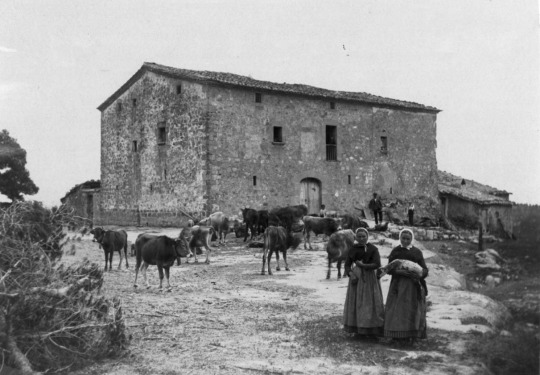
Women with a herd of bulls and cows in front of a farmhouse in Solsona | Photo © Lluís Vila i d’Abadal, Estudi de la Masia Catalana (C.E.C.)
The mas is characterized by closely intertwined spatial activities that create a distinct organization of living and working spaces. In households of peasants and lower-income families, the division between these activities was minimal or nonexistent, resulting in overlapping tasks that offset the traditional sexual division of labor.
The components of the mas facilitated the exploitation and maintenance of crops, orchards, livestock, and more. They also played a crucial role in shaping a new social structure, typically centered around one or several families, within a rural setting. The main inhabitable space at the heart of this complex is known as the "masía" or "farmhouse."
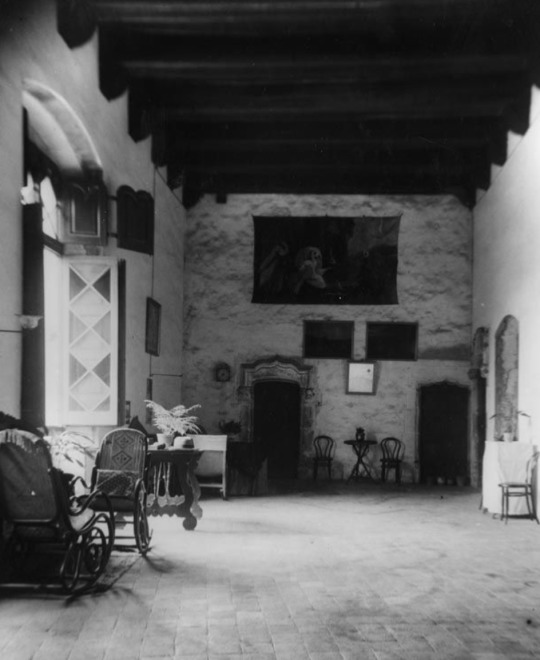
Interior of a "sala de la pallaresa" (main social room) in Santa Coloma de Gramenet. | Photo © Josep de Cabanyes, Estudi de la Masia Catalana (C.E.C.)
The masía, as an architectural typology, holds significance within this context as it represents a milestone in territorial repopulation strategy. It goes beyond domesticating nature and establishes a new social and economic system in previously uninhabited areas. To truly understand it, it is necessary to examine the architectural spaces that form this typology as a complex system of cohabitation between humans, non-humans, and nature. In the X, XI, and XII centuries, the initial settlements of these masías emerged along the stabilized borders of the Iberian territory. These locations were not primarily determined by geographical factors but rather by historical and social events that shaped a novel system of agricultural exploitation.
The house is internally organized into three spatial sections, separated by four sturdy masonry walls. These walls, sometimes as thick as one meter, are constructed using a mix of stone and soil materials. They provide support for the wooden beams that form the floors above. The construction system of the house follows a logical and coherent set of rules, emphasizing efficiency and functionality to accommodate all domestic activities under one roof.

Typological organisation of a Catalan Masia | Photo © self-office
On the ground floor, the three spatial sections typically consist of a central hall, flanked by the kitchen, stables, and cellar on either side. Moving to the upper floor, the central room serves as the primary living space and also functions as an entryway to the various rooms or bedrooms located on both sides. This central room holds great significance as it becomes the focal point of the house. It serves as a gathering space for communal activities, cultural ceremonies, and religious rituals, making it the most representative area of the entire dwelling.
In certain typologies, a third level exists, designed for permanent ventilation, providing an ideal space for drying clothes or hay by harnessing the natural winds that occur at that height. This section of the house exhibits some morphological variations, often standing apart from the main structure and possessing its own distinct identity within the overall complex. The formal expression of the "masía" has adapted to varying resources and construction systems over time while maintaining essential elements.
Following the second industrial revolution, particularly in Catalonia during the 1950s and 1960s, rapid economic growth led to a significant population increase, resulting in a mass migration from rural areas to urban centers. This shift had a profound impact on the local economies that relied on these longstanding agricultural structures. The traditional role of the Catalan Masia as a caretaker of the land and its productive essence gradually succumbed to a culture of mass consumption and the influence of a free market economy. Nowadays, many of these houses have been abandoned or sold as secondary residences, vacation homes, hostels, or restaurants, primarily driven by the speculative nature of the real estate market.
We find ourselves in a pivotal moment in history where vernacular architecture is reclaiming its significance in the architectural realm. Examining these typologies as low-tech structures holds immense potential for offering alternative solutions in response to the pressing climate crisis. Additionally, it enables us to restore our connection with nature as human beings.
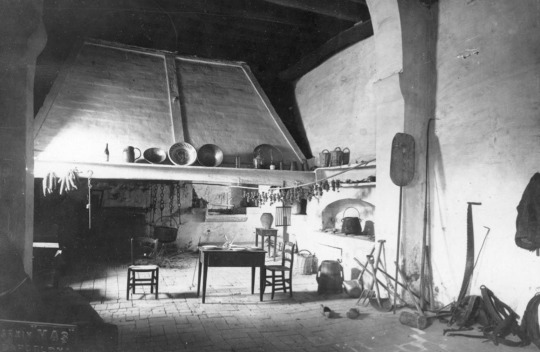
Kitchen with a floor fireplace in the Vilassar Castle, equipped with furniture, utensils, and tools. | Photo © Unknown, Estudi de la Masia Catalan (C.E.C.)
However, this metaphorical "return to the countryside" has historically emerged during periods when urban life becomes increasingly challenging and uncertain, and it is intertwined with a romanticized idealization of rural living. Thus, it is important to recognize this romantized idea should be balanced with a realistic understanding of the complexities and challenges of rural life. As we learn from vernacular architecture, we must adapt it to modern needs and achieve a certain balance between urban and rural settings.
Today, this nostalgia for the countryside coincides with new environmentalist political stances, increased global awareness of urban air quality issues, and a rising housing crisis in Western cities. The lack of public investment in housing makes it urgent to explore alternative living options for a generation facing ongoing instability. Recent changes in family structures, gender identities, work organization, and the impact of new technologies provide an opportunity to foster alternative households that can open up new territories and economies.
The Catalan Masia has the potential to bring about new socio-economic dynamics in neglected rural areas. Initiatives like housing cooperatives in these regions are already challenging the traditional model of individual property ownership. One notable example is the "El Turrós" project, created in 2021 by the organization "Sostre Cívic" to promote cooperative housing. The project goes beyond providing housing and becomes a collective effort that utilizes available rural spaces to generate social and economic value. This approach ensures that housing remains accessible and stable for community members and encourages sustainable practices such as local sourcing, waste reduction, and the development of small-scale businesses. This, in turn, nurtures a sense of interdependence and care among residents.

“La Nogareda” renovation project by self-office | Photo © self-office
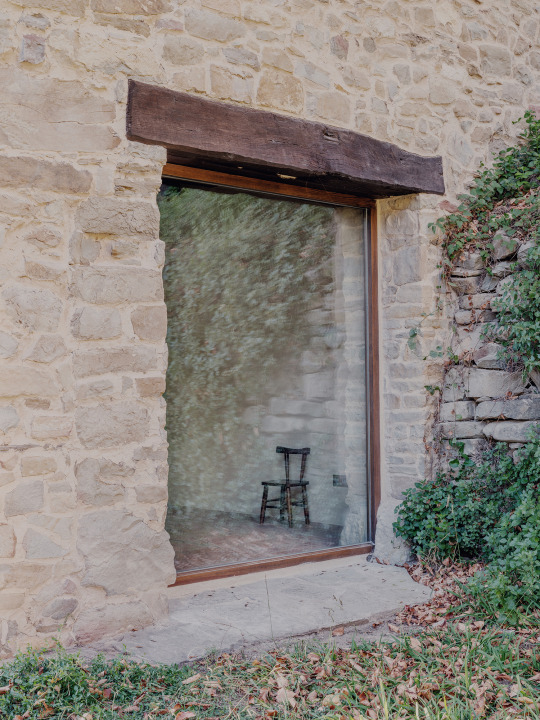
“La Nogareda” renovation project by self-office | Photo © Pol Masip
The revitalization of this architectural typology not only offers a multitude of possibilities for reclaiming traditional identities and forging new social structures but also provides an ideal setting to embrace ethics of care and sharing as a way of communal living. By reframing our perspective on the living environment through a care-oriented lens, we shift away from designing spaces solely based on functionality and instead emphasize the well-being of the individuals who occupy them.
As a practice, our first comissions have primarily involved working with these typologies. Since each project has very specific constraints, it became a great opportunity to develope new formal investigations and question established notions of domesticity.

“La Nogareda” renovation project by self-office | Photo © self-office
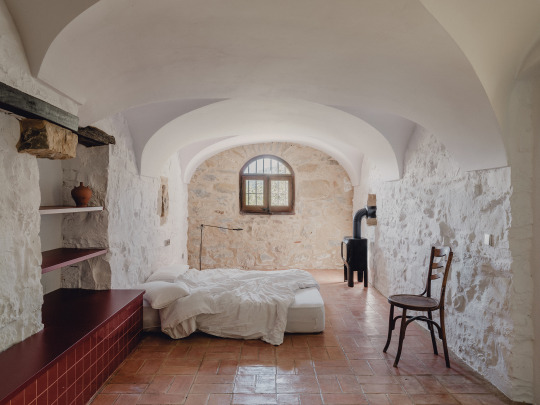
“La Nogareda” renovation project by self-office | Photo © Pol Masip
One of our first commissions involved transforming animal quarters into habitable rooms. The existing spaces presented peculiar proportions: one was unusually low in height but spacious, while the other was relatively tall but not spacious enough. Consequently, each space required distinct renovation strategies, and users were compelled to adapt their habits to the nature of the given space.
The potential of these uncertain spaces is highly significant, as they empower users to make more personalized decisions in establishing their domestic rituals and lifestyles. By actively engaging with the spatial possibilities presented by the Catalan Masia, users can cultivate a sense of ownership and connection to their unique preferences, values, and aspirations.
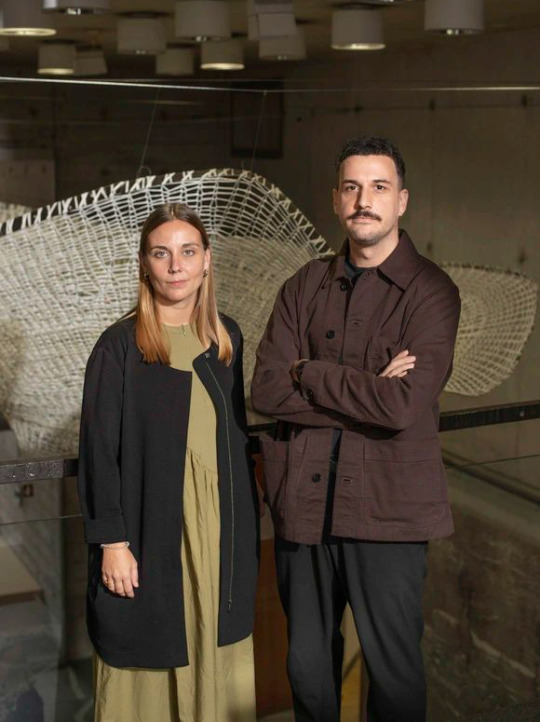
self-office are Laura Solsona and Eduard Fernandez. | Photo © Urban Cerjak
-
by self-office - Digital Architectuul Fellow of LINA.
#self-office#lamasia#catalanvernacular#territorialcare#domesticity#housingrenovation#cooperativehousing#countryside#rural
13 notes
·
View notes
Text
Well, Twitter owner Elon Musk is being vile again. That's a frequent enough occurrence that it usually doesn't rise to the level of news, since Musk spends most of his day looking for affirmation in the mentions of far-right sh-tposters and memelords, but Musk remains one of the richest people on the planet and whenever a man willing to blow $44 billion on a website just so that he could rig it up to give himself a louder voice than anyone else, it becomes news when the very rich cultivator of far-right adulation keeps promoting antisemitism, neo-Nazi themes, and attacks on democracy itself.
So yeah, apparently we have to do this again. As per usual it started with Musk putting his two cents in in the replies of another anti-Muslim tweet by notorious far-right conspiracy promoter and fascism-booster Amy Mek, because—again—Musk appears to crave the attention of every fascist and protofascist on the internet. Mak promoted a video allegedly from an imam vowing France will "become an Islamic country through Jihad," upon which some other ultracreep piped up with "Thanks to the white female vote," which caused allegedly richest person in the world to himself reply that "The childless have little stake in the future."
That's already about five kinds of creepy and weird but we'll set that aside for the moment, because it's yet another of Musk's blue check weirdos who set the ball rolling toward its natural Worst Possible Take.
"Democracy is probably unworkable long term without limiting suffrage to parents. Helps solve the procreation problem, too," mused blue-check user "fentasyl".
"Yup," replied Elon.
All right, so here's where we're at. Musk is poking around in the replies of one of the most notorious anti-Muslim boosters of neo-Nazis and white supremacists, as he so often does, sees Some Dude opine that "the white female vote" are the reason that France will supposedly fall to jihad, elaborates with his own belief that "the childless have little stake in the future" and are the real problem here—because the imaginary white females are apparently childless, too?—and by the end is agreeing that democracy itself is "probably unworkable" unless we bar non-parents from voting at all. Just another normal day.
Incidentally, while all of this was going on, Twitter itself was going belly up, with engineers having to hastily put together a new Elon scheme to put new caps on how many tweets you're allowed to read, possibly because Musk's previous decision to not pay his damn bills was now reaching the "find out" end stage.
You can understand, then, why the man would need to relax by yet again questioning the usefulness of democracy. It's that or do his damn day job, and he's terrible at his day job.
The reason all of this matters is that Musk is again diving into some very, very sketchy stuff. Musk is perhaps one of the most famous figures in the small and bizarre "natalist" movement, people who believe that society will collapse if human population growth isn't maintained. If you think that sounds suspiciously close to the neo-Nazi belief that it's "white" humanity that is in danger of dwindling, or to the arguments of eugenicists in general, you're right: The movement is almost entirely white and is clogged with just those sorts of people.
"It would be so easy to dismiss this as yet another unhinged comment, except for the deep intersections between natalism and fascism. These ideas are dangerous, and when we start to see them spread casually by people in power, we shouldn't stand idly by," tweets Dr. Jacquelyn Gill, and that is the problem. Musk's $44 billion purchase of Twitter, a struggling company not likely to be worth half of that, was initially portrayed by Musk as some sort of grand plan to improve society. On taking over, it became evident that Musk's "improvements" consisted of rigging the algorithm to give himself virtual site omnipresence, while using that to boost pandemic conspiracy theories, delegitimize government, and repeatedly call into question whether democracy itself was sustainable.
Musk keeps wallowing through far-right hate accounts and coming up with his own theories of how the world should work. His inability to not share those pearls of wisdom with the rest of us has, however, fully laid to rest any notion that Musk's "genius" consists of anything but relentless narcissism. Most of the billionaire's critiques for society fall somewhere between bizarre and malevolent.
What does it mean, that the "childless have little stake in the future?" That's just crank talk. So children themselves have no stake in the future, until they've either impregnated someone or been impregnated? How does adoption play into this? Do you have a stake in the future if you adopt a child, or is it only the genetic parents who have this stake? When limiting "democracy" to bar everyone but parents from electing
the United States government, would voting certificates be transferred along with the child during an adoption?
What if a child dies? Would the parent, again childless, be again barred from voting? How in the artisanal ketamine-tinted hell would any of this work, and do the people making crank suggestions like this even listen to themselves, or is it all pumped out for shock value, unmolested by such trivialities as common sense?
The notion that "white females" in particular are valueless to democracy until and unless they give birth is some deeply creepy Aryan shit, but Musk keeps diving right in to support it, over and over. The man has a fetish for fascism, and he's certainly not shy about showing it off.
5 notes
·
View notes
Note
2 things.
Although history is always biased.
Still.
Have you ever heard about " the promise land" ?
1948 war when all the arab wanted to distroy isreal ????
Don't you see a terrorist organisation like Hamas has killed more than 1500 from Israel too ???
No election is in gaza since 2007. (62% Palestine don't want hamas as their representative for your reference, check CNN article from last year).
We are humans
We always tend to weak side in a War.
It's for survival of isreal .
If he will stop the war, there will be no isreal left on earth.
It's a war of survival.
And war is always destructive.
Weather it's yaman war. Syria war, china war against Muslims, Russia - ukrain war, Vietnam war or taliban war or iran against their woman war .
War is always destructive.
Feel bad for both side . Pray that war should stop
But at least try to be human first and see both side suppression. Not one side.
Thank you from ( armania, yeah you might not even know about our situation, because you are biased)
Excuse me where have you been for the last century? Palestinians have been in an open air prison without access to clean water and food. Where was your compassion then? Added to the fact that Israeli citizens are just as guilty and many harbor the oppressive hatred for Palestinians. This incident didn’t start this month.
it was around 140 years ago that the zionists began their satanic (LA) attempt at occupying Palestine under the guise of “Judaism”. Throughout the years they have had issues at maintaining a population and have invested heavily in bringing settlers and criminals from across the globe to assist them. There was even a ministry which was established to aid the population crisis, as the Indigenous Palestinians have a history of strong and continuous population growth. It should be noted that the zionist state is considered a safe haven for felons and criminals. Today we are witnessing Divine Justice as the zionist terrorists (LA) are leaving the Land which was never theirs to begin with. HOW COULD YOU LEAVE YOUR LAND !! The Palestinians aren’t giving up for theirs! But with when Israel faces what’s the normal thing in Palestinian lives they are running to leave the country!! The history of oppression faced by the Palestinians is overwhelming, as the inhumane occupiers target civilians, women and children of all ages for their own selfish purposes. We hope to see full Liberation soon.
The Jewish rabbis know very well that the Promised Land is just a lie. You just don't know your religion well.
Yes, I heard about the 1948 war. It was a war to regain the usurped lands after Britain gave the Jews part of Palestine to establish a state as compensation for the Holocaust massacre, which the Palestinians had nothing to do with, and to get rid of the Jews in the entire world. If England wants to get rid of them and compensate them for the massacre, it must give them a piece of its land, not land that it does not already own. That is why the Balfour Declaration, which is the reason for establishing your occupied state, was called “the promise of those who do not have to those who do not deserve”.
They stole the land and established a state by force on land that does not belong to you, and when the owners of the land defend it, you accuse them of terrorism!!. What a contradiction? This is the typical zionst, the aggressor. They are the one who stole the land and killed its people to obtain a homeland that they do not have the right to compensate for a crime that the Palestinians did not commit.
How can Gaza hold elections when it has not been living a normal life for more than 16 years because of their siege of it? tell me how? What is worse than this is that for 16 years you have been bombing Gaza in the first place, and when its people try to get out of this open prison, you accuse them of terrorism. They are not terrorists, they are just defending their stolen land since 1984. As for the CNN article, I do not trust the Western media at all, and the evidence is what is happening these days. It is just media directed to defend Israel. They all say the same thing, and if one of them tries to defend the other side, they silence him, for example, like this video. Even Facebook deletes anything that defends Palestine and leaves only the part that defends Israel.
I do not object to your saying that you are human. But you are evil and call for peace!. What abiased
They are the aggressors and still living in the role of the victim.
Israel are killing the weakest side in the war.
A Palestinian child is killed every 15 minutes by Israeli aircraft missiles. You do not have an ounce of mercy in your hearts.
And you as an Armenian citizen, if something happens to your country will they defend it! Like you are doing now! Even with words No they are just self centered people who thinks that they are the beat one on the earth and they should be treated as a superiors! They didn’t defend about their claimed land and now are escaping to another western countries!! Will they stand with you!Will you bomb your land even if there’s a war their HOW COULD ON THE EARTH SOMEONE BOMB THEIR COUNTRY! Israeli people they are so coward that’s a fact no one can deny it! It’s on their blood! They will get afraid from any tiny sounds! They got afraid from handmade rockets!!!! And cried to US “please help us” US are more braver than them! And if the war continues you will see no Israelis will stand to it they will let the Americans defend it!
#ask#palestinian people#isreal#palestinian#us politics#we stand with palestine#palestinian lives matter#genocide in palestine#justice for palestinians#from the river to the sea palestine will be free#justice for palestine#save palestine#palestinian film#palestine news#free gaza#gaza strip#genocide#gaza
2 notes
·
View notes